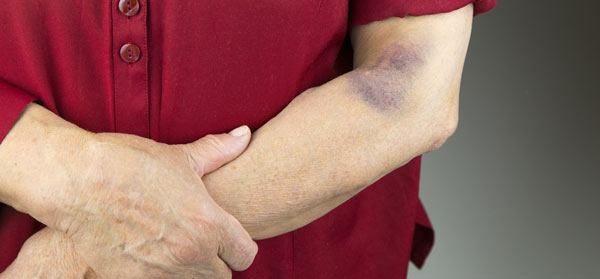Do you find that you bruise as easily as a ripe peach? If so, it could be down to a number of factors and it’s often not something to be concerned about.
So, what is a bruise? A bruise is a contusion, usually a bluish-purple patch, which shows under the skin when internal blood vessels are damaged by some form of physical trauma.
This trauma could be the result of you injuring yourself after bumping into something, or something bumping into you. Sometimes bruising occurs deep in your tissues, organs and bones, causing swelling and pain.
Here are some of the reasons that you could bruise more easily:
-
as you get older, your skin loses its protective layers of fat, becoming thinner; thin skin is more susceptible to bruising
-
you could lack vitamin c – which is vital both for the production of collagen in the skin and for healing wounds
-
certain skin conditions – such as purpuric dermatosis – can lead to greater bruising
-
having pale skin means that bruises are more visible
-
it is possible that genetics and family history have a part to play, too
-
if you are taking blood-thinning medicine, for example warfarin or another anticoagulant for anti-clotting, bruising is a common side effect
-
certain steroids (e.g. corticosteroids, prednisone and prednisolone), and antibiotics, can also make you more prone to bruising.
Natural-based remedies for bruises
There are a few natural-based remedies for a bruise, including:
-
apply an ice cold compress: you can use a pack of frozen vegetables, wrapped in a towel. Place the compress onto the affected area for 10 minutes to reduce inflammation
-
rub some arnica gel or ointment containing arnica on the bruise
-
aloe vera gel can help to reduce the pain of a bruise and repair broken blood vessels; apply the gel to the bruised area.
Finally, to prevent bruising in future you can ensure you have enough vitamin c. The body cannot store vitamin c so you can keep this topped up by eating fruit and vegetables or by taking a supplement (45mg) daily.
A bruise should start to fade after about two weeks. If it hasn’t gone away after three or four weeks, you should seek medical advice; a bruise that does not heal could signify a more serious condition, such as haemophilia, leukaemia and aplastic anaemia. Dark skin discolorations, sometimes mistaken for bruises, can indicate intolerance for insulin so could be a sign of diabetes.
Related articles:
Seven things to know about your body
Should I use ice or heat?
Five facts about blood thinners

